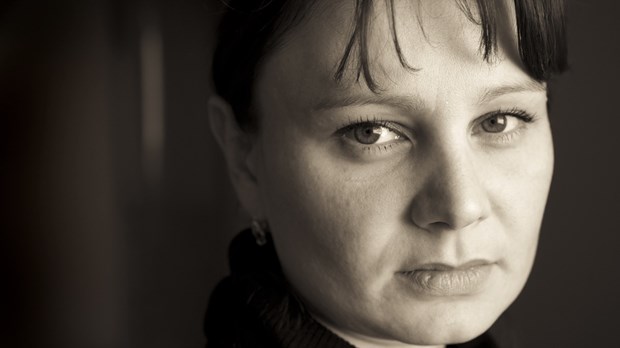Confessions of a Recovering Control Freak

When my doctor told me I had an ulcer, I was stunned. I thought only really stressed-out people got ulcers. Why would I get an ulcer?
I mentally listed the things in my life I thought could be stressful:
- Raising three boys under the age of six
- Maintaining a healthy relationship with my husband
- Cooking, cleaning, running a household
- Paying bills, making ends meet each month
- Choosing schools for my children
- Talking with a sister struggling through a divorce
- Worrying about my mom, who's recovering from breast cancer
- Chasing a two-year-old chocolate Lab that constantly runs away
- Planning a family trip to Mexico
Sure, I had some trying circumstances to deal with, but they were no more difficult than what others around me faced. So why didn't everyone else in the world have an ulcer?
My diagnosis led me to do some serious self-examination. Slowly I realized it wasn't so much my circumstances as my need to be in control of those circumstances that stressed me out. I wasn't allowing God to be the one in control of my hectic life. And I could end up making my life physically miserable if I continued to place undue pressure on myself to always be "in control." But how could I change a part of my personality that had been with me for as long as I could remember?
From the time I was in elementary school, I was encouraged to believe in myself. Our performance-oriented society taught me "where there's a will there's a way," and "you can do anything you set your mind to do." I always received high grades, was popular among my peers, and was successful in sports. I was considered a very self-confident child—but even then I was a chronic worrier.
I remember competing on a gymnastics team and feeling sick to my stomach before competitions. As I stood on the balance beam, everyone's eyes riveted to my every move, all I could hear were my pounding heart and my skinny little knees knocking together. I had no assurance I wouldn't fall off the beam. I became so nervous and upset, I finally begged my parents to let me quit. I couldn't handle the pressure I put on myself.
Now, as an adult, I'm realizing most circumstances are out of my control—and this terrifies me. I can't ensure my family's safety every time they ride with someone else. I can't guarantee my husband's business will thrive. I can't control every teacher my children have in school. I can't be sure my mother is cancer-free. I can't provide financially for my divorced sister and her three children. But quitting life isn't an option!
Prior to my ulcer, I lived as someone who clung to that small, square wooden beam with all my might. I frantically attempted to pull myself up, get back on top, and feel in control of my routine. I tried to work out every little detail in my life—and everyone else's. But this impossible task drained me physically and spiritually.
I tried so desperately to muster up my own strength to survive that I didn't see God's mighty hand reaching down to pull me up, steady me, and walk with me on that little beam.
Although I'd always appeared impeccably calm to others, on the inside I'd been reeling out of control. It was humbling to realize I suffered from a stress-related ulcer.
But because I'd been a "control-freak" for so long, I now needed to take drastic measures. I had to give up coffee, orange juice, and tomato sauces for my ulcer. But more importantly, I decided to give up self-confidence and learn to live God-confidently.
My first step was to admit to God, my husband, and my closest friends that I was stressed out because I'd been relying on myself rather than the Lord. This admission improved my communication with those around me. It also helped me learn to identify the signals that indicate I'm putting too much pressure on myself—my heart beats faster, my breathing quickens, and I feel a sharp pain under my right rib cage. These symptoms let me know I need to simplify my life to reduce my stress.
For example, I found it incredibly stressful to get dinner ready for a family of five. After telling my husband this part of my day was tension-filled, we decided to simplify our meals. So instead of preparing gourmet dinners, I make burritos, potato soup, or even blueberry pancakes. I now know our family can obtain the nutrition we need from eating simple, healthy foods. In addition, I remind myself that the amount of time I spend making their meals doesn't reflect the amount of love I have for them.
My husband and I made other changes too. Now he pays all the bills and balances our checkbook. And our children have taken on several chores—such as feeding the dog, setting and clearing the table, cleaning their own rooms, and other little things I used to do.
We also "down-sized" the number of activities in our life. Now the kids and I spend more time playing in our own backyard than we do driving to a zillion different functions. My husband, Zane, and I also let go of some of our weekly commitments and instead reserve this time to work on our marriage—doing a Bible study together or enjoying a romantic dinner after the kids are in bed. It's a relief to have the freedom to do whatever we want.
Most importantly, I began meditating on Bible verses that deal with God's control. Jeremiah 29:11 has been especially reassuring: "'I know the plans I have for you,' declares the Lord, 'plans to prosper you and not to harm you, plans to give you hope and a future.'" Whenever I feel that nagging pain in my stomach, I meditate on this verse, which reminds me of God's positive plan for my life.
Sometimes I still wake up in the middle of the night anxious about decisions I'm facing. For example, where I live, parents select the public school they want their children to attend, then the school district conducts a lottery to decide who goes where. Because I couldn't control the outcome, I constantly worried about where our children would end up. What kinds of friends would they make? If they attended a school outside our neighborhood, how would they make friends that live nearby?
Rather than tossing and turning, I got up and looked for a specific Bible verse to apply to this specific situation. Then I read Proverbs 16:33: "The lot is cast into the lap, but its every decision is from the Lord." As I meditated on this verse, I discovered my irrational thoughts becoming replaced by peace, and I was able to fall back to sleep.
I also began studying Bible stories about characters who lived God-confidently, such as King David. As a youth, he trusted in the Lord to win the battle with Goliath. David confidently proclaimed to the nine-foot giant standing before him, "You come against me with sword and spear and javelin, but I come against you in the name of the LORD Almighty, the God of the armies of Israel, whom you have defied. This day the LORD will hand you over to me" (1 Sam. 17:45-46). I know that what God did for David, he can do for me.
My family doctor once told me it takes three weeks to change a habit. Unfortunately, I think my lifelong habit of trying desperately to be in control will take a bit longer.
Fortunately, I do have a painful physical reminder—my ulcer—which flares up when I begin to fret. I don't want to live my life hanging upside down on a balance beam, grasping tightly to keep from falling. I want to let go and let God lift me up and carry me through life.
Jean Blackmer is a freelance writer living with her family in Colorado.
Copyright © 1998 by the author and Christianity Today/Today's Christian Woman magazine.
Read more articles that highlight writing by Christian women at ChristianityToday.com/Women
 Read These Next
Read These Next
 Midlife MomsThe joys of parenting after 40
Midlife MomsThe joys of parenting after 40
 Christian MindfulnessLearning how to be awake and alive
Christian MindfulnessLearning how to be awake and alive








 Homepage
Homepage